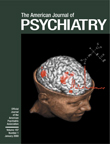Earnings Changes
To the Editor: The article by Mingliang Zhang, Ph.D., Kathryn M. Rost, Ph.D., and John C. Fortney, Ph.D. (1), provides important insight into the real cost of the treatment of depression for patients, rather than the cost assumed by third-party payers. The authors suggest that the reason for the cost savings for patients treated by psychiatric specialists over those treated in the general medical sector stems from specialists’ “more extensive training and expertise in treating mental health problems” (1, p. 112). Twice the number of patients treated by specialists as patients treated in the general medical sector had treatment in accordance with Agency for Health Care Policy and Research guidelines (2, 3). However, only 48% of the patients treated by specialists had treatment that followed those guidelines. Because the authors did not provide the details of their analysis, we cannot reach a conclusion regarding the meaning of this finding. Which of the guidelines were not followed? What was the use of certain medications, the dosing, the length of treatment, and the like? If 52% of the specialists were not in compliance with the guidelines because they use antidepressants other than those recommended by the Agency for Health Care Policy and Research, the meaning of the authors' finding would be very different from what it would be if the specialists' noncompliance were based on their failure to make patients' drug levels reach accepted therapeutic doses. This is equally true for the 79% of the physicians in the general medical sector who were not in compliance with the guidelines. When training psychiatrists and nonpsychiatrists about the treatment of depression, knowing what they do and do not do would guide the educational endeavor.
1. Zhang M, Rost KM, Fortney JC: Earnings changes for depressed individuals treated by mental health specialists. Am J Psychiatry 1999; 156:108–114Link, Google Scholar
2. Depression Guideline Panel: Depression in Primary Care, vol 1: Detection and Diagnosis: Clinical Practice Guideline #5: Agency for Health Care Policy and Research Publication 93-0550. Rockville, Md, US Department of Health and Human Services, Public Health Service, AHCPR, 1993Google Scholar
3. Depression Guideline Panel: Depression in Primary Care, vol 2: Detection and Diagnosis: Clinical Practice Guideline #5: Agency for Health Care Policy and Research Publication 93-0550. Rockville, Md, US Department of Health and Human Services, Public Health Service, AHCPR, 1993, pp 1–175Google Scholar



